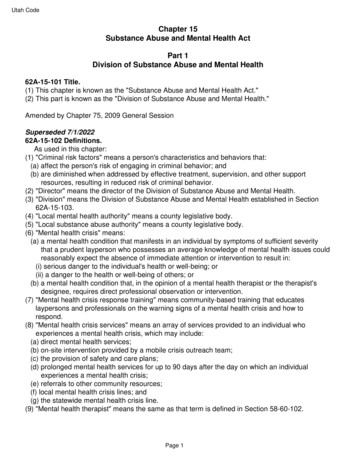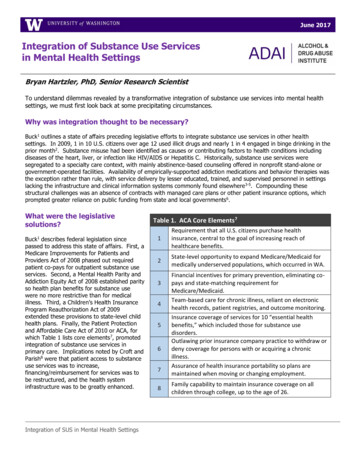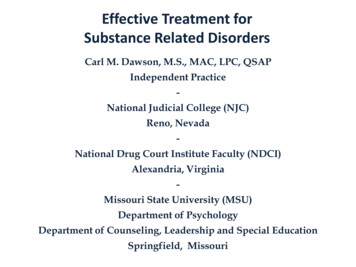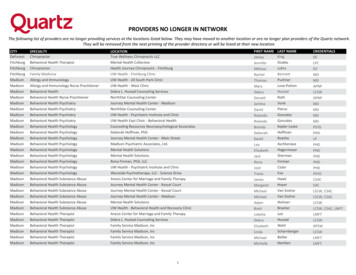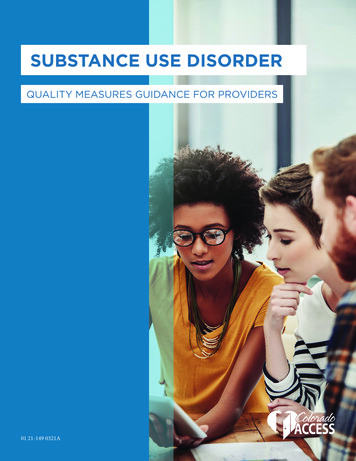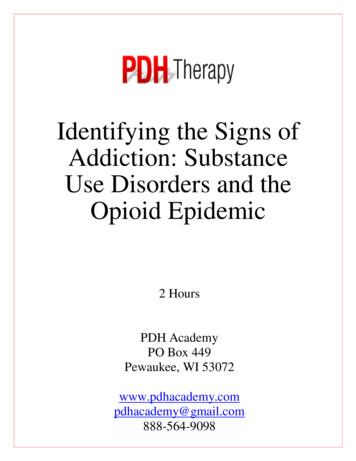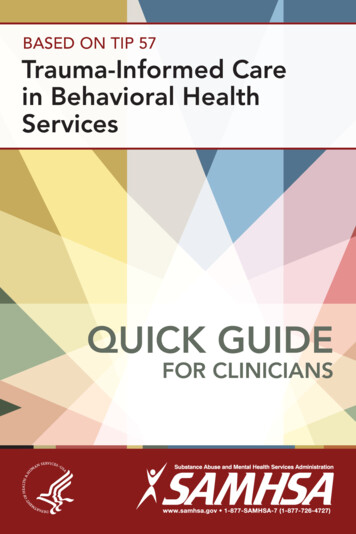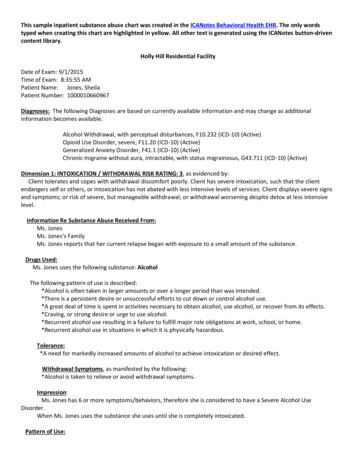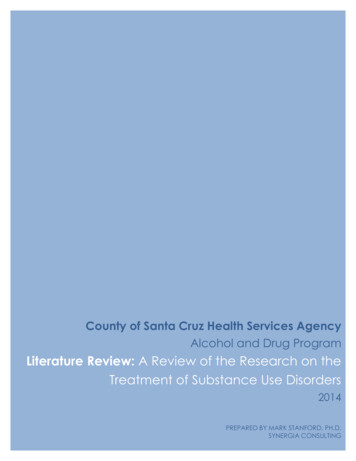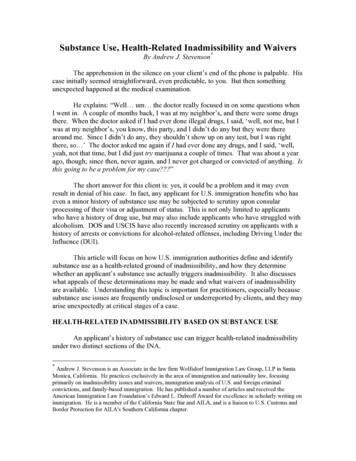
Transcription
Substance Use, Health-Related Inadmissibility and WaiversBy Andrew J. Stevenson*The apprehension in the silence on your client’s end of the phone is palpable. Hiscase initially seemed straightforward, even predictable, to you. But then somethingunexpected happened at the medical examination.He explains: “Well um the doctor really focused in on some questions whenI went in. A couple of months back, I was at my neighbor’s, and there were some drugsthere. When the doctor asked if I had ever done illegal drugs, I said, ‘well, not me, but Iwas at my neighbor’s, you know, this party, and I didn’t do any but they were therearound me. Since I didn’t do any, they shouldn’t show up on any test, but I was rightthere, so ’ The doctor asked me again if I had ever done any drugs, and I said, ‘well,yeah, not that time, but I did just try marijuana a couple of times. That was about a yearago, though; since then, never again, and I never got charged or convicted of anything. Isthis going to be a problem for my case?”The short answer for this client is: yes, it could be a problem and it may evenresult in denial of his case. In fact, any applicant for U.S. immigration benefits who haseven a minor history of substance use may be subjected to scrutiny upon consularprocessing of their visa or adjustment of status. This is not only limited to applicantswho have a history of drug use, but may also include applicants who have struggled withalcoholism. DOS and USCIS have also recently increased scrutiny on applicants with ahistory of arrests or convictions for alcohol-related offenses, including Driving Under theInfluence (DUI).This article will focus on how U.S. immigration authorities define and identifysubstance use as a health-related ground of inadmissibility, and how they determinewhether an applicant’s substance use actually triggers inadmissibility. It also discusseswhat appeals of these determinations may be made and what waivers of inadmissibilityare available. Understanding this topic is important for practitioners, especially becausesubstance use issues are frequently undisclosed or underreported by clients, and they mayarise unexpectedly at critical stages of a case.HEALTH-RELATED INADMISSIBILITY BASED ON SUBSTANCE USEAn applicant’s history of substance use can trigger health-related inadmissibilityunder two distinct sections of the INA.*Andrew J. Stevenson is an Associate in the law firm Wolfsdorf Immigration Law Group, LLP in SantaMonica, California. He practices exclusively in the area of immigration and nationality law, focusingprimarily on inadmissibility issues and waivers, immigration analysis of U.S. and foreign criminalconvictions, and family-based immigration. He has published a number of articles and received theAmerican Immigration Law Foundation’s Edward L. Dubroff Award for excellence in scholarly writing onimmigration. He is a member of the California State Bar and AILA, and is a liaison to U.S. Customs andBorder Protection for AILA's Southern California chapter.
First, INA § 212(a)(1)(A)(iv) declares inadmissible any alien “who is determined to be a drug abuser or addict.” This section is applied against applicants who haveengaged in non-medical use of psychoactive substances. It is not necessarily limited toillegal drug use.Second, INA § 212(a)(1)(A)(iii) declares inadmissible any alien:who is determined (I) to have a physical or mental disorder andbehavior associated with the disorder that may pose, or has posed, a threatto the property, safety, or welfare of the alien or others, or (II) to have hada physical or mental disorder and a history of behavior associated with thedisorder, which behavior has posed a threat to the property, safety, orwelfare of the alien or others and which behavior is likely to recur or tolead to other harmful behavior Drug or alcohol use may be deemed a “mental disorder” under this section. This groundof inadmissibility may be applied against applicants who have a history of drug- oralcohol-related incidents, arrests or convictions1 that have involved personal injury orproperty damage.In order to be declared inadmissible pursuant to either of these sections, a civilsurgeon or panel physician must examine the applicant and classify them as having a“Class A” condition. The civil surgeon or panel physician’s Class A diagnosis wouldconfirm that the applicant is a “drug abuser or addict” or has a “physical or mentaldisorder” with associated harmful behavior,2 and would automatically triggerinadmissibility.3Alternatively, the civil surgeon or panel physician could classify the applicant ashaving a “Class B” condition, either as a drug abuser or addict in remission, or as aperson with a mental disorder which is controlled by medication or in remission with noassociated harmful behavior. A Class B diagnosis does not render the applicantinadmissible on health-related grounds,4 although it does suggest to immigrationauthorities that follow-up medical care may be necessary in the United States.51In addition to health-related inadmissibility, it is important to keep in mind that applicants with anycriminal convictions related to drugs or alcohol may also be subject to criminal inadmissibility at INA §212(a)(2).2See 42 CFR § 34.2(d).3See 9 FAM 40.11 N3.3(1) (DOS); AFM ch. 23.3(a).4See 9 FAM 40.11 N3.3(2) (DOS); AFM ch. 23.3(a).5If the reviewing physician deems the applicant will necessarily or likely undergo medical treatment in theUnited States related to this diagnosis, this could lead to public charge inadmissibility issues. See Centersfor Disease Control and Prevention, Division of Global Migration and Quarantine, Instructions to PanelPhysicians for Completing New U.S. Department of State MEDICAL EXAMINATION FOR IMMIGRANTOR REFUGEE APPLICANT (DS-2053) and Associated WORKSHEETS (DS-3024, DS-3025, and DS3026), available at: ions.pdf, [hereinafter PanelPhysicians Forms Instructions] at 1 (noting that one purpose of the migration health assessment is to“determine if medical conditions or mental disorders exist that would [r]equire the applicant to receive
U.S. GOVERNMENT DEFINITIONS AND CLASSIFICATIONS OFINADMISSIBILITY“Drug Abusers or Addicts”Federal regulations and policy define which applicants may be classified as “drugabusers” and “drug addicts,” and provide substantial guidance as to how applicants canbe accordingly found inadmissible.42 CFR § 34.2(g) defines “drug abuse” as the “non-medical use of a controlledsubstance listed in section 202 of the Controlled Substances Act,6 as amended (21 U.S.C.802), which has not necessarily resulted in physical or psychological dependence.”7Similarly, 42 CFR § 34.2(h) defines “drug addiction” as the “non-medical use of acontrolled substance listed in section 202 of the Controlled Substances Act which hasresulted in physical or psychological dependence.”8 The Technical Instructions writtenby the CDC’s Division of Global Migration and Quarantine for Civil Surgeons and PanelPhysicians clarify that “non-medical use” of “psychoactive substances” not listed in theControlled Substances Act can also be grounds for a finding of drug abuse or addiction,but only if such use has resulted in “harmful or dysfunctional behavior patterns orphysical disorders.”9The phrase “non-medical use”—a central part of the regulatory definition for“drug addiction” or “drug abuse”—is defined as “more than experimentation with thesubstance.”10 Although “experimentation” is not explicitly defined, the TechnicalInstructions provide the example of “a single use or marijuana or other non-prescribedpsychoactive substances such as amphetamines or barbiturates.”11 According to thisstrict definition, any applicant who has used marijuana, cocaine, amphetamines,barbiturates or any other controlled substance more than once may be declaredinadmissible as a “drug abuser.”12long-term institutionalization or maintenance income provided by the U.S. government after resettlementthat is the become a public charge”).6Section 202 of the Controlled Substances Act lists a wide range of substances, from “commonly abused”illicit drugs to prescription drugs with widely accepted medical uses.7(Emphasis added).8(Emphasis added). Note that a criminal conviction classifying the defendant as an “addict” is notnecessarily determinative for immigration purposes. See Matter of K-C-B, 6 I&N Dec. 274 (BIA 1954).9See Centers for Disease Control and Prevention, Division of Global Migration and Quarantine, TechnicalInstructions for Medical Examination of Aliens [for panel physicians]; Centers for Disease Control andPrevention, Division of Global Migration and Quarantine, Technical Instructions for Medical Examinationof Aliens in the United States [for civil surgeons], § III(C)(2)(a)(2), available athttp://www.cdc.gov/NCIDOD/dq/technica.htm [collectively hereinafter “CDC-DGMQ TechnicalInstructions”].10Id. at § III(C)(2)(c). See also 9 FAM 40.11 N9.1(c).11CDC-DGMQ Technical Instructions, § III(C)(2)(c). See also 9 FAM § 40.11 N9.1(c).12AILA, through its DOS liaison committee, has vigorously contested the Technical Instructions’definition of “drug abuse” as overly broad, alleging that it is inconsistent with CDC’s Instructions to PanelPhysicians for Completing Medical History and Physical Examination Worksheet (DS-3026). See AILA,“Practice Alert on ‘Drug Abuser or Addict’ Grounds of Inadmissibility,” published on AILA InfoNet at
Notwithstanding the number of times an applicant may have engaged in substanceuse, the recency of substance use is also a critical element in determining inadmissibility.The Technical Instructions state that an applicant who is currently using or has used acontrolled substance in the past three years will be classified with a Class A condition13and will be declared inadmissible. The Instructions clarify that use of any controlledsubstance in the past three years is “illegal and qualifies as a Class A condition, whetheror not harmful behavior is documented.”14 Any applicant who has used an unlisted (i.e.non-controlled) psychoactive substance in the past two years will also be classified with aClass A condition and declared inadmissible.15In contrast, any applicant who has a history of substance use, but has not used acontrolled substance in the past three years and has not used an unlisted psychoactivesubstance in the past two years will be considered in “remission.” The TechnicalInstructions direct that applicants in “remission” should be classified with a Class Bcondition, and thus should not be automatically declared inadmissible as “drug abusers oraddicts.”16To aid panel physicians and civil surgeons in distinguishing betweencircumstances warranting Class A and Class B determinations, the Technical Instructionsinclude a Table entitled “Reporting Results of Evaluation for Psychoactive SubstanceAbuse.”17 A copy of this table is attached to this article as Appendix 1.Drug- and Alcohol-Related Offenses as “Mental Disorders” with Associated HarmfulBehaviorFederal policy and practice manuals also define when incidents of substance usemay be classified as mental disorders with associated harmful behavior sufficient totrigger health-related inadmissibility.Doc. No. 06020110 (posted Feb. 1, 2006), at 2. The CDC’s instructions to panel physicians completingMedical History Form DS-3026 appear to imply that the phrase “drug abuse” should be defined as a“maladaptive pattern of substance use” leading to “recurrent” or “continued use,” as directed by theDiagnostic and Statistical Manual of Mental Disorders. See Panel Physicians Form Instructions, supranote 5, at 11. Accordingly, AILA-DOS liaison attorneys argued that a panel physician’s analysis ofwhether an applicant is a “drug abuser” use should be made not just in light of the number of times of use,but also with regard to whether the applicant’s use represents a “maladaptive pattern.” However, AILA’sappeals to DOS have not resulted in any policy changes, as DOS subsequently directed consular officers todefer to the “professional judgments” of CDC’s panel physicians. See AILA, “Visa Office Clarification onDrug Abuse/Addict Ineligibility Standard,” published on AILA InfoNet at Doc. No. 06052460 (posted May24, 2006), at 1-2. In the aftermath of these liaison inquiries, consular practitioners consistently report thatpanel physicians make Class A findings of “drug abuse” according to the strict definition of the TechnicalInstructions—when an applicant has used a controlled substance more than once, and the last use occurredwithin the past three years.13See CDC-DGMQ Technical Instructions, § III, Table 6.14Id. at § III(C)(2)(a)(1).15See id. at § III, Table 6.16See id.17Id.
The Technical Instructions indicate that alcoholism, alcohol abuse and drug abusecan all be classified as “mental disorders.”18 However, “the mere presence of a physicalor mental disorder does not by itself render [an] applicant ineligible” for a visa.”19 Inorder for an applicant to be inadmissible, one or more incidents of substance use “must beassociated with a display of harmful behavior.”20“Harmful behavior” is defined as “a dangerous action or series of actions by thealien that has resulted in injury (psychological or physical) to the alien or another person,or that has threatened the health or safety of the alien or another person, or that hasresulted in property damage.”21 A criminal conviction “is not determinative” as towhether the applicant has a history of harmful behavior.22 Therefore, the nature of thebehavior must be qualitatively examined by the medical examiner.23Generally, the Technical Instructions direct that Class A certifications should onlybe made under this section if an applicant currently engages in substance use associatedwith harmful behavior, or has a history of substance use with harmful behavior which islikely to recur.24 Conversely, if an applicant’s pattern of substance use and associatedharmful behavior is controlled by medication25 or is in remission,26 and thus the harmfulbehavior is unlikely to recur, a Class B diagnosis may be made.27Similar to the table regarding drug abuser or addict determinations, the TechnicalInstructions also include a Table entitled “Reporting Results of Evaluation for Mental andPhysical Disorders with Associated Harmful Behavior.”28 A copy of this table is attachedto this article as Appendix 2.U.S. GOVERNMENT IDENTIFICATION AND INVESTIGATION OF ANAPPLICANT’S SUBSTANCE USEThere are various ways in which an applicant’s substance use may be disclosed bythe applicant or affirmatively identified by U.S. immigration authorities. In allapplications for immigrant visas or adjustment of status, substance use questions arise as18See id. at § III, Table 4 (items 7-8).9 FAM 40.11 N8.20See id.21CDC-DGMQ Technical Instructions, § III(B)(2)(c); 9 FAM 40.11 N8.1(a).22See 9 FAM 40.11 N8.1(b).23Alcohol or drug use is not by itself is not considered a mental disorder with associated harmful behavior.See CDC-DGMQ Technical Instructions, § III, Table 4, “Mental Disorders for which Harmful Behavior Isan Element of the Diagnostic Criteria” (noting that “behavior [is] necessary to establish the diagnosis” ofinadmissibility on this ground based on alcohol and drug use).24See id. at Table 5.25Applicants whose condition is controlled by medication may be required to certify in writing that he orshe “will continue medication or other treatment to control the disorder and prevent harmful behavior.” Seeid. at p. III-13, n. ****.26“Remission” is defined as “no pattern of the behavioral element of the disorder for the past 2 years.” Seeid.27See id. at Table 5.28Id.19
part of the required medical examination by a civil surgeon or panel physician.29Additionally, applicants must disclose on many forms whether they are a “drug abuser oraddict,” have ever used illicit drugs, or have a substance-related “mental disorder” withassociated harmful behavior.30 Likewise, if an applicant has ever been arrested orconvicted for a drug- or alcohol-related offense, this must also be disclosed on manyforms. In some instances, regardless of whether the applicant has already completed amedical examination, USCIS or DOS officials may order the applicant to be re-examinedby a civil surgeon or panel physician regarding substance use issues.Medical Examination and Screening by Civil Surgeons and Panel PhysiciansAs part of the required medical examination for immigrant visa applicants, a civilsurgeon or panel physician interviews all applicants regarding their medical history andconditions. The Technical Instructions direct the medical examiner to ask “specificquestions about psychoactive drug and alcohol use [and] history of harmful behavior.”31Initial substance use screening questions are normally general (e.g. “have you ever usedillegal drugs”), but if an applicant reveals a history of use, questions become much moredetailed regarding the substance(s) used, frequency of use, and date of last use. Whilenot necessarily commonplace, some panel physicians have been reported to ask nonaffirmative and confusing questions regarding substance use (e.g. “have you used drugsless than 10 times”). Medical examiners also frequently take blood or urine samples,which may be tested to detect substance use.Additionally, the examining physician will inquire about records and likely ask toreview all available documents pertaining to hospitalizations and institutionalizations,32including the applicant’s participation in rehabilitation programs. Examiners may alsoask to review police, military, school, employment or other records for evidence of“harmful behavior nonmedical use of psychoactive substances or evidence of alcoholabuse or dependence.”33 An examiner might even go so far as to interview theapplicant’s family regarding substance use “when practical and clinically relevant asthis information may not be included in medical records.”34 The examining physicianmight ask questions, for example, to an applicant’s spouse if he or she is undergoing amedical examination for immigration purposes on the same day as the applicant.Finally, if the civil surgeon or panel physician cannot make a “definitivediagnosis” of whether the applicant has a Class A or Class B condition, they may referthe applicant to a specific medical or mental health specialist to evaluate their condition.3529See CDC-DGMQ Technical Instructions, § III(C)(1).See, e.g., Form DS-156, Question 38; Form DS-230 Part II, Question 30a; Form I-485, Part 3, Question1a. CBP Form I-94W Question A, also screens these issues for applicants for admission under the VisaWaiver Program.31CDC-DGMQ Technical Instructions, § II(A)(1)(a)(4).32See id. at §§ II(A)(1)(a)(1)-(2).33Id. at § III(B)(3)(b).34Id. at § III(B)(3)(c).35See id. at § II(C).30
After receiving a report from the specialist, the medical examiner will complete theirreport and diagnosis to DOS or USCIS.36Referrals for Medical Examination or Re-Examination of Certain ApplicantsDOS and USCIS officials also may ask screening questions regarding anapplicant’s substance use at in-person interviews, often as part of reviewing immigrationforms. If information disclosed on an immigration form or an answer to a verbal questionhighlights that an applicant has engaged in substance use, the DOS or USCIS officer mayrefer the applicant to a panel physician or civil surgeon for examination or reexamination. As a practical matter, these referrals commonly occur when an applicantdiscloses substance use or convictions for the first time in an interview with immigrationofficials.Applicants with DUI Arrests or ConvictionsOver the past several years, DOS and DHS have issued specific guidanceregarding alcohol use and applicants with DUI arrests or convictions. Agencymemoranda and policy clearly reflect that U.S. immigration authorities consider drunkdriving a serious mental disorder with great potential for harmful behavior. However,DOS and USCIS officials will not make any health-related inadmissibility determinationswithout first receiving a report and Class A diagnosis of the applicant by a medicalprofessional. Thus, immigration and consular officers may refer applicants with a recordof alcohol-related arrests or convictions to be examined or re-examined by a panelphysician or civil surgeon with regard to these incidents.These referrals commonly occur at the consular level with NIV applicants whohave a record of DUI arrests or convictions, but have not previously visited a panelphysician. They may also occur for consular IV applicants who did not discuss theirrecord of DUI arrests or conviction with the panel physician during their medicalexamination. Likewise, USCIS will refer AOS applicants to civil surgeons for furtherreview if the applicant has a record of arrests or convictions, and no discussion of theapplicant’s record appears in the medical examination report.In June 2007, DOS released a cable mandating referrals to panel physicians for allvisa applicants with “a single drunk driving arrest or conviction within the last threecalendar years or two or more drunk driving arrests or convictions in any time period” orwhere “there is any other evidence to suggest an alcohol problem.”37 In the cases of IVapplicants who have already undergone examination by a panel physician, medicalexaminers are directed to “evaluat[e] for the presence of a mental disorder previouslyunnoticed before [becoming] aware of [an] alcohol-related arrest.”38 The cableclarifies that incidents of alcohol abuse or drunk driving alone are not a sufficient basis36Id. at § III(B)(4)(c).DOS Cable, “Guidance on Processing Visa Applicants with Drunk Driving Hits” (June 7, 2007),published on AILA InfoNet at Doc. No. 07071760 (posted Jul. 16, 2007), at 1.38Id.37
for health-related inadmissibility, and must be accompanied by harmful behavior to makean applicant ineligible to receive a visa.39 However, this policy of mandatory referrals topanel physicians for further examination will add an extra step which complicates anddelays consular processing for many applicants.Similarly, USCIS officers are required to refer AOS applicants for re-examinationby a civil surgeon “when the criminal record of [the] applicant reveals a significanthistory of alcohol-related driving arrests and/or convictions, and the Form I-693 medicalreport does not reflect that the alcohol-related driving incidents were considered by thecivil surgeon.”40 However, not all applicants with a record of DUI arrests or convictionswill be re-examined. Referral for re-examination is only mandatory for applicants with a“significant criminal record of alcohol-related driving incidents,” namely: One or more arrest/conviction for DUI/DWI while the applicant’s driver’slicense was suspended, revoked or restricted at the time of the arrest due toa previous DUI/DWI incident; One or more arrest/conviction for DUI/DWI where personal injury ordeath resulted from the incident(s); One or more conviction for DUI/DWI where the conviction was a felonyin the jurisdiction in which it occurred or where a sentence ofincarceration was actually imposed; Two or more arrests/convictions for DUI/DWI within the preceding twoyears; or Three or more arrests/convictions for DUI/DWI where onearrest/conviction was within the preceding two years.41In the re-examination, the civil surgeon will investigate the applicant’s “mental status specifically addressing the incidents revealed in the criminal record”42 and must make aClass A diagnosis to trigger health-related inadmissibility.PRACTICE POINTERS: PREPARING YOUR CLIENT FOR A MEDICALEXAMINATION OR A REFERRAL TO A MEDICAL EXAMINERIf a client has disclosed a record of substance use or related arrests or convictionsto you, you should prepare your client to affirmatively disclose these facts to the panelphysician, civil surgeon or immigration officer. Any applicant who gives incomplete or39Id.; see also 9 FAM 40.11 N8.3 (revised pursuant to the 6/7/07 DOS cable).DHS Memorandum, W. Yates, “Requesting Medical Re-examination: Aliens Involved in SignificantAlcohol-Related Driving Incidents and Similar Scenarios” (Jan. 16, 2004), published on AILA InfoNet atDoc. No. 04022362 (posted Jan. 23, 2004), at 2-3.41Id. at 3.42Id.40
inconsistent answers to a medical examiner regarding substance use may be subjected tofurther investigation of their medical history. If evidence of substance use is ultimatelydiscovered through documents or interviews that contradict the applicant’s attestations tothe medical examiner, these inconsistencies may be documented in the medicalexamination report. According to such a report or other inconsistent statements made atthe time of interview, a DOS or USCIS officer could declare an applicant inadmissiblenot only on health-related grounds, but also on the basis of fraud or willfulmisrepresentation.43Immigration practitioners may also affirmatively address substance use and drugand alcohol-related arrests and convictions in a short brief to support their client’sadmissibility. This may be submitted to DOS, attached to the requisite DS forms, or toUSCIS, attached to Form I-485. A declaration from the applicant should be submittedwith the legal brief, detailing which substances were used, frequency of use, date of lastuse, whether the applicant’s use ever involved harmful behavior, and whether theapplicant was ever arrested or convicted for substance-related offenses. Letters ofsupport from friends, family, religious leaders or others may also be submitted to supportan applicant’s claims of being an infrequent user, in remission or having a history of noharmful behavior associated with use. The brief should also include copies of allapplicable medical or criminal documentation for agency review, including: Medical records regarding hospitalization or treatment for substance use,including participation in rehabilitation programs; Documentation of any prescribed medication related to the abovetreatment; Certified court disposition(s) of any criminal case(s) relating toDUI/substance use; and/or Police report(s) relating to arrest(s) for DUI/substance use.Copies of these documents should also be prepared to provide to the medical examinerupon request. Failure to provide these documents may result in delays in adjudication orissuance of an RFE.As a practical matter, DOS and USCIS referrals to panel physicians and civilsurgeons for examination or re-examination of substance use will, at minimum, delay theadjudication of an applicant’s case. It may take as long as several months from the timeof referral until the time of adjudication. This is especially true if the case is pendingabroad, and it depends on the country, the appointment availability of panel physicians,and whether or not an applicant is referred to a psychiatrist or other specialist for furtherevaluation. At the same time, in some countries, referral to adjudication may take as little43See INA § 212(a)(6)(C)(i). This is an especially important consideration because health-relatedinadmissibility based on substance use may be merely temporary (until an applicant has been in remissionfor several years), whereas fraud-based inadmissibility is permanent.
as one to two weeks. Other country-specific complications may also arise. For example,in Mexico, the only panel physicians certified to review applicants for health-relatedinadmissibility in the entire country are located in Ciudad Juarez. NIV applicants fromall over Mexico who are referred for medical examination due to a DUI arrest in the pastthree years have no choice but to travel to Ciudad Juarez, and then back again to the postwhere they applied to await final adjudication and visa issuance. Different countries orconsular posts, depending on local culture and other factors, may also define “otherevidence suggesting an alcohol problem” in very different ways and therefore will havevarying referral processes. In the United States, obtaining a referral-based appointmentwith a civil surgeon may present fewer challenges, but USCIS adjudication time mayvary greatly depending on the Field Office with jurisdiction over the case.APPEALS AND WAIVERS OF HEALTH-RELATED INADMISSIBILITYDETERMINATIONS BASED ON SUBSTANCE USEIf an applicant is declared inadmissible on health-related grounds because ofsubstance use, he or she still may have several options to be admitted to the UnitedStates. First, although on a practical level this strategy may have a very low chance ofsuccess, the applicant may request an advisory opinion or a medical re-examination bythe CDC to contest a Class A diagnosis triggering inadmissibility. Second, the applicantmay be eligible for a waiver of inadmissibility.Seeking an Advisory Opinion or Medical Re-examination by the CDC after anErroneous Class A Determination by a Medical ExaminerIf a visa applicant disagrees with a determination made by a panel physiciancharacterizing the applicant as inadmissible on health-related grounds, they may requestthe consular officer to seek an advisory opinion from the CDC.44 A CDC consultantphysician will then review the panel physician’s report and Class A diagnosis of theapplicant, and will provide the consular officer with an opinion as to whether thediagnosis was correctly made.4542 CFR § 34.8 also authorizes the CDC to re-examine the medical condition of anapplicant classified by a civil surgeon or a panel physician as having a Class A conditiontriggering inadmissibility. However, there is no regulatory authority for applicants orattorneys to initiate this re-examination process directly with CDC. It appears thatappealing parties must communicate with DHS to request a re-examination, although theprocess for doing so is unclear.46 As part of the re-examination process, “a board of44AILA, “Visa Office Clarification on Drug Abuse/Addict Ineligibility Standard,” published on AILAInfoNet at Doc. No. 0605246
* Andrew J. Stevenson is an Associate in the law firm Wolfsdorf Immigration Law Group, LLP in Santa Monica, California. He practices exclusively in the area of immigration and nationality law, focusing primarily on inadmissibility issues and waivers, immigration analysis of U.S. and foreign criminal convictions, and family-based immigration.
